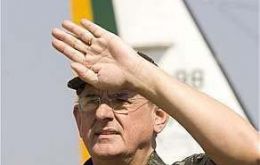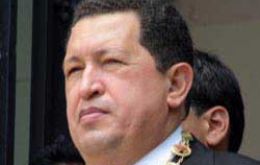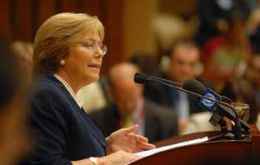MercoPress. South Atlantic News Agency
Stories for 2007
-
Friday, November 2nd 2007 - 20:00 UTC
Falkland Islands: Weekly Penguin News update

Headlines: 'For the country I love'; Charter flight on the way; Helicopters for FIGAS?; Wife to wear the trousers at Casa Rosada.
-
Friday, November 2nd 2007 - 20:00 UTC
US bank stocks sent world markets plunging

World markets plunged on Thursday amid renewed fears about the credit crisis, sending shares in finance firms sharply lower. On Wall Street the Dow Jones Industrial Average shed more than 360 points or 2.6%, after two leading banks were downgraded earlier in the day.
-
Friday, November 2nd 2007 - 20:00 UTC
Brazil hikes military spending with new defense plan

Brazil has announced it plans to boost military spending by more than 50% in 2008, to around an estimated 5.4 billion US dollars and draw up a new defense plan, but told its neighbors they should not worry.
-
Friday, November 2nd 2007 - 20:00 UTC
Canadian dollar soars to record 107 US cents

The Canadian dollar jumped more than two U.S. cents Friday to a record 107.18 US cents on strong employment data and a rise in oil prices, while the green back resumed its weakness against most major currencies. So far this year the Canadian dollar has appreciated 24% against the US dollar.
-
Friday, November 2nd 2007 - 20:00 UTC
IMF says it's time Argentina deals with outstanding debt

In one of his first statements since becoming the IMF new managing director, Dominique Strauss-Kahn said it was time Argentina deals with the issue of its outstanding debt, including to the Paris Club of creditor nations, thus favoring the return of investments to the country.
-
Friday, November 2nd 2007 - 20:00 UTC
US labor market surprise: 4.7% steady unemployment
The number of new jobs created by the United States economy leapt dramatically in October with employers adding 166.000 posts, twice the expected number, reported the Labor Department.
-
Friday, November 2nd 2007 - 20:00 UTC
“Supreme Chavez” reforms approved by Venezuelan assembly

Venezuela's National Assembly gave on Friday its final approval to a package of constitutional reforms that strengthens the powers of President Hugo Chavez and his Socialist-Bolivarian republic project.
-
Friday, November 2nd 2007 - 20:00 UTC
For new IMF chief oil prices at such level “is no surprise”

The International Monetary Fund's new managing director, Dominique Strauss-Kahn, Friday said the U.S. dollar remains overvalued --repeating the IMF forecast for the greenback--. However he discarded a recession in the US and said “it's no surprise to see the price of oil at such a level”
-
Friday, November 2nd 2007 - 20:00 UTC
Haiti Sri Lankan UN troops repatriated for sexual abuse

The United Nations announced Friday that it will repatriate more than 100 Sri Lankan peacekeepers serving with the UN Stabilization Mission in Haiti on disciplinary grounds.
-
Friday, November 2nd 2007 - 20:00 UTC
Bachelet sees poverty as the main threat to regional democracy

Chile's Michelle Bachelet who will be hosting the Ibero-American summit next week defended the legitimacy of Latinamerican governments, particularly Venezuela, and insisted that the prevailing consensus among leaders is that poverty represents the main threat for the region.
